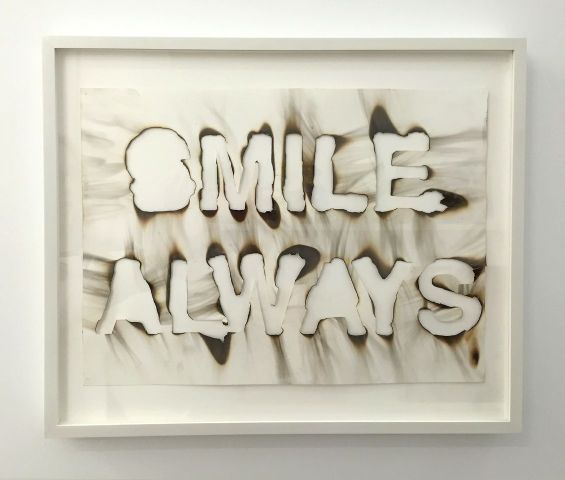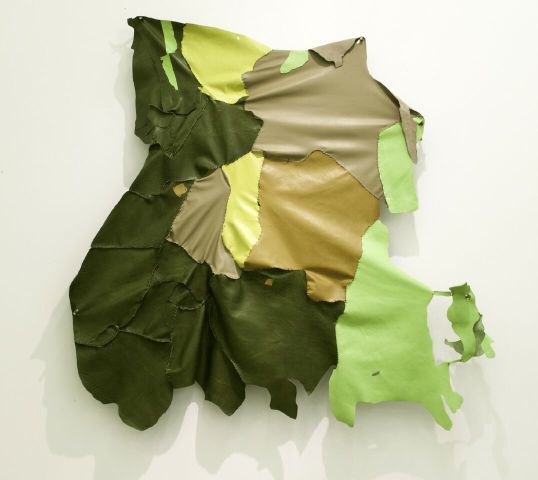


















In her fifth solo exhibition at the gallery, Rachel Owens incorporates the aesthetics of fashion retail, kindred to the art world. The artist’s own preoccupation is: Our compulsion to consume resources, real-estate, and each other at an unsustainable rate. For many years in New York I was employed as a window dresser and visual merchandiser in high end fashion stores, literally part of the “luxury” trade – it was how I survived in order to make the work critical of the very thing I was doing. I explore how and if the gallery is different from those shops and if sculpture is much different from handbags or property.
The centerpiece is a 10 foot tall replica of the gallery’s own front doors, cast in broken bottle glass and resin, with additional casts of the doors’ accompanying metal bumpers, architectural evidence of the building’s prior use as a parking lot. Alternately fragile and imposing, the two pieces formally reference both Pop and Minimalist eras, with antecedents in Serra’s propped steel and Oldenberg’s The Store, as aware in turn of Whiteread’sHouse as of art’s ever-fleeting fashions and the symbiotic role between art and real estate (including the repeated rise and demise through inevitable rent and tax hikes, as is now currently affecting Chelsea).
Other cast glass works include her POPs: the hands of six different women mounted on lifts as in a department store’s glove display. However, instead of graceful outstretched fingers, the hands are raised in clenched fists— alternately a symbol of solidarity, strength, or resistance and linked with myriad associations from ancient Assyrian goddess Ishtar to early 20th century American miners to civil rights and feminists movements. The title is an acronymic, short hand nod to the Power of People, and is simultaneously aware of historic and recent events in addition to the cartoon onomatopoetic sounds of a cartoon punch.
Nearby, a round table alludes to a footwear display and features eight colorful versions of her Heel, a cast of the artist’s foot with a metal screw in place of a stiletto one. In proper merchandising form, they encircle a pair of Boots, originally cast from a live horse. Another table features two large cast elephant tusks modeled on Satao, the enormous and renowned bull elephant in Africa, who was poached last June. Like with her Heels, the works are available in a variety of colors, more in line with retail expectations than art world norms. The accumulations of these fragments resonate like phantom limbs on the body politic.
In Skins (NYC), patchwork textile pieces of the five boroughs of New York City hang from hooks. Made from remnant and clearance leather from a luxury manufacturer, the boroughs are sectioned according to community boards and voting districts and color coded according to maps from the last census. The darkest parts of each map are less than 5% white and the lightest part of each map is less than 5% black. The scraps of our fetish are here reduced to simple demography. Everything is for sale. That fact is manifest in the small publication Q1Sp15, a photo essay that acts as a skeleton key to the conceptual backdrop of the show and is another direct merchandising reference. Inspired by retailers’ lifestyle catalogues (or “magalogues”), the work’s title uses fashion code for collections, here indicating its release in Quarter 1, Spring 2015.
Service Commitments and 1st @ Service are text pieces with corporate sales credos appropriated from the “employee’s only” sections of two luxury stores. Literally burned into canvas, the rules of the game are laid out clearly and provide the title for her exhibition, bringing to mind the comment of Stanley Marcus of the lavish Texas store Neiman Marcus: We try to impress on our people that service is half profession, half religion.
With this exhibition, Owens continues to reconcile her intellectual interests with a need to make unapologetically beautiful objects (almost always composed of trashed and recycled materials). The New Yorker states “There’s an undeniable sweetness to Owens’s work, even when she tackles earnestly political subjects.”

POPS, 2015
varying sizes (between 36 and 48 in tall by appr. 4x5 in, groups of 2 or 3 fists)
broken glass and resin casts

Skins- Manhattan, 2015 (on the wall)
Leather, thread & steel
117x26x6"
Dock and Graffiti Dock, 2015 (foreground)